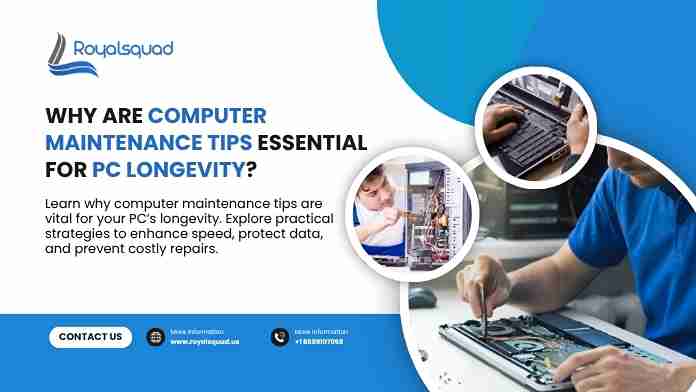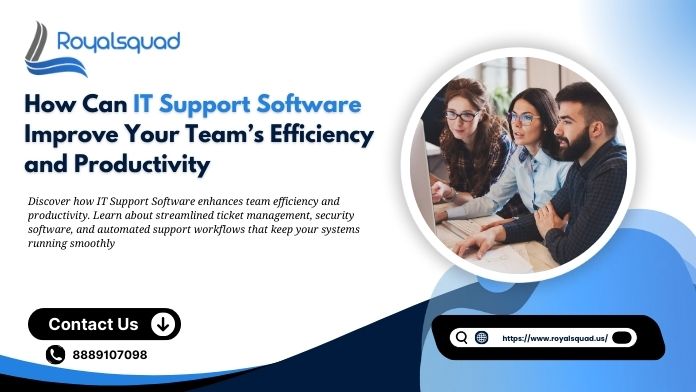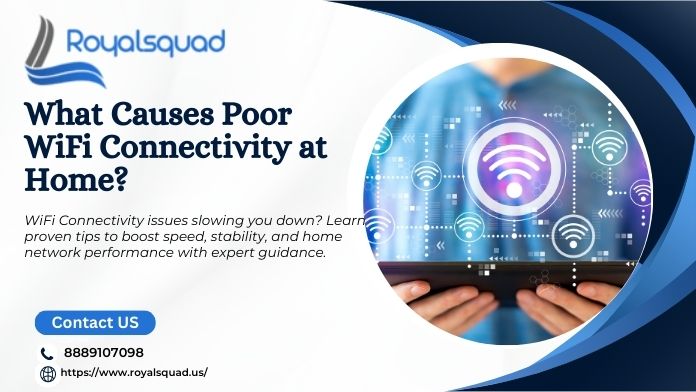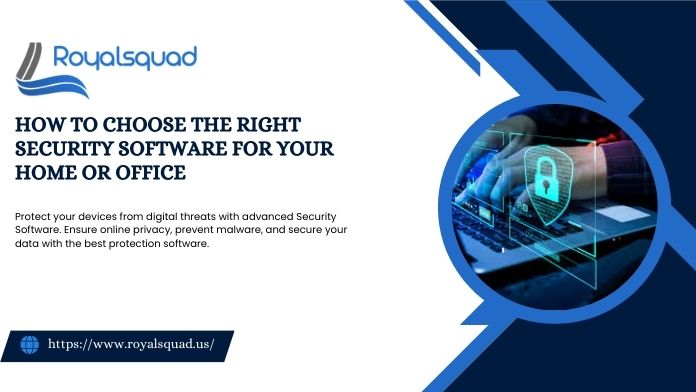
Why Are Computer Maintenance Tips Essential for PC Longevity?
A properly serviced computer works smoothly, remains secure, and has a longer lifespan. Similar to cars that require regular maintenance to prevent breakdowns, your PC also requires timely care and services. Computers are now an integral part of our lives for work, learning, communication, and entertainment. Without regular care, though, they become slow, erratic, or even expose themselves to security risks. This makes learning and using the appropriate computer maintenance tips essential to extending your device's life and ensuring optimal performance.
From file organization to handling hardware, numerous small yet significant practices can significantly contribute to maintaining your computer in its best condition. Why these habits are so crucial and how they lead to longevity in your PC is detailed below.
Improved Performance and Speed
Over time, computers accumulate temporary files, unwanted programs, and background processes that can slow down the system. By regularly cleaning unused files and software settings, users can significantly improve system speed. For instance, removing temporary files and unwanted startup programs ensures that your PC will not waste its resources on unnecessary tasks. Basic maintenance guidelines for system performance can lead to noticeable improvements in daily usage, such as quick boot times and seamless multitasking.
Protection Against Malware and Security Threats
An old system is a risky system. Failing to install updates or apply security patches can leave your device vulnerable to malware and attackers. Upgrading your operating system, antivirus program, and apps helps keep vulnerabilities at bay, which cybercriminals use to launch attacks.
Additionally, performing regular virus scans and avoiding questionable downloads are essential components of security-oriented general computer maintenance advice. By ensuring that your system is protected against threats, you're not only safeguarding information but also preventing your PC from experiencing performance slowdowns caused by infections. Services such as Microsoft assistance are also useful when handling critical OS-level security tasks or troubleshooting issues that arise.
Maximized Hardware Lifespan
PC parts, such as hard disks, fans, and RAM, will wear out if they are not properly maintained. Overheating results from dust accumulation within your system, which can lead to the destruction of your hardware. Regular cleaning of your computer's interior and exterior prevents this problem.
Ventilation is also essential. Place your PC in a well-ventilated room to prevent overheating. These computer maintenance tips not only extend the life of your device but also minimize the requirement for expensive hardware repairs or replacements.
Storage Optimization and File Organization
A messy hard drive not only hits performance; it also complicates locating vital files. Periodic deletion or archiving of old files and folder organization enhances efficiency, enabling you to work more effectively. Disk cleanup software and storage viewers can help locate large, redundant files occupying valuable space.
Additionally, hard drive defragmentation (for HDD users) will also improve access speeds and system response time. For SSD users, software that supports drive health monitoring and trimming can provide the same benefits.
System Stability and Fewer Crashes
Failing to maintain computers can lead to frequent system crashes, error messages, and even data loss. Maintenance ensures problems are detected and repaired early before they become complicated issues. Performing disk checks and monitoring system logs can alert users to potential hardware or software issues.
These tips and tricks for maintaining computers are particularly beneficial for users who rely on their PCs for professional or creative work. Stable systems result in fewer disruptions, less downtime, and increased productivity. This becomes even more important when depending on remote printing solutions or other external device connectivity that is contingent on a stable system.
Enhanced Software Efficiency
Applications, such as operating systems, require periodic updates to stay compatible and effective—obsolete software results in compatibility problems, bugs, and sluggish system performance. Keeping your drivers and applications updated ensures your PC performs optimally without glitches or compatibility problems.
Additionally, removing unnecessary software that you no longer use frees up system resources and reduces the system load in the background on your PC. This lightens the system and makes it run faster.
Backups Prevent Data Loss
One of the most neglected areas of computer maintenance is periodic data backup. Whatever the reason behind it, whether due to hardware failure, accidental deletion, or a malicious attack by malware, data loss can prove to be catastrophic. Backing up your data on external drives or cloud storage means that vital files are recoverable.
Scheduling a regular automatic backup or using high-quality backup software is a good way to protect your data. It is one of the most critical computer health maintenance tips and is also a source of peace of mind for the user.
Physical Care Matters
Though software upkeep is essential, don't neglect physical care. Cleaning your computer's exterior prevents dust from infiltrating vents and overheating the laptop. Clean keyboard crevices and vents using compressed air and microfiber cloths to wipe the screen.
Laptop users must also ensure that they do not use their systems on soft surfaces, such as beds or cushions, as this can hinder air circulation. Storing devices within protective sleeves or cases also reduces the physical damage to devices during storage or travel. This is particularly necessary for Apple Mac IT Support Services users, whose systems tend to run on more sensitive hardware configurations.
Reduced Repair Costs
Neglecting maintenance may seem innocuous in the short term, but it often leads to costly repairs in the long run. Whether it's a hard drive that's dying due to overheating or a virus-induced system corruption, these issues can usually be prevented with proper care.
Implementing computer maintenance advice not only extends the lifespan of your PC but also protects you from sudden failures and costly emergency repairs. Prevention here is much less expensive than cure.
Better Battery Life for Laptops
Laptop users could benefit significantly from maintenance habits tailored to mobile devices. For example, maintaining the battery in good condition by avoiding overcharging, utilizing battery-saving modes, and reducing screen brightness can improve battery life.
Additionally, shutting down unnecessary tabs and programs when not in use reduces processor usage, thereby increasing battery life. Easy guidelines on PC maintenance, such as these, directly contribute to more prolonged use and better laptop health. Users who tend to tether their devices to a wi-fi home network should also ensure they adjust network settings and background syncs carefully to conserve power.
Peace of Mind and Reliable Usage
There is no benefit of regular maintenance that is more underappreciated than the peace of mind it provides. Having the knowledge that your system is operating effectively, securely, and dependably lets you work without worry of a sudden crash or slowdown.
These tendencies are not only for IT professionals. Even novice users can follow basic computer maintenance tips to keep their machines in good condition. Maintenance is a time-invested effort that yields high returns in terms of user satisfaction and system longevity.
With a world becoming increasingly connected, even Smartphone support is getting entangled with desktop use. Ensuring that all the equipment works well together frequently rests on the functionality and health of your central computing system.
Quick Checklist for Long-Term Maintenance
To assist with streamlining the process, here is a helpful checklist of good computer maintenance techniques and tips to make part of your routine:
- Update Software Regularly: Ensure your operating system, antivirus, and applications are regularly updated.
- Run Antivirus Scans Weekly: Keep your system virus-free and free of spyware.
- Clean the Hardware Monthly: Dust the keyboard, vents, and screen.
- Delete Temporary Files: Use the built-in tools such as Disk Cleanup or Storage Sense.
- Uninstall Unused Programs: Free up space and reduce background activity.
- Check Hard Drive Health: Use diagnostic software to monitor storage units.
- Back-Up Data: Periodically save crucial files to external drives or the cloud.
- Manage Startup Programs: Prevent programs to slow down booting.
- Optimize Storage: Arrange files, eliminate duplicates, and defragment if necessary.
- Monitor System Logs: Identify early indications of failure or malfunction.
Final Thoughts
Spending the time to perform routine maintenance on your computer is not only a good idea—it's a requirement for anyone who wants their machine to run as smoothly and last as long as possible. Whether you're an occasional user, a student, or a professional, these habits are necessary to keep your PC healthy, secure, and responsive.
By applying these easy yet powerful computer maintenance tips, you not only safeguard your investment but also enhance your daily computing experience. Be proactive, be regular, and reap the long-term benefits of a well-maintained system.





_1728455153.png)